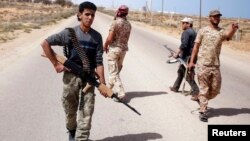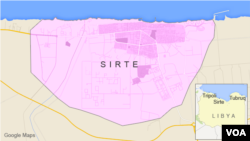Libyan militiamen battling the Islamic State’s affiliate in their country say most of the jihadi fighters are not Libyans — the bulk of them, they say, come from neighboring North African nations.
But they warn the jihadis are rapidly growing in strength and are being directed by highly experienced commanders.
The Islamic State’s new affiliate in Libya last month overran the coastal city of Sirte, the hometown of deposed Libyan strongman Colonel Moammar Gadhafi, who was ousted in a NATO-backed uprising four years ago.
In an out-of-the-way tightly secured camp, fighters from one of Misrata’s top militias reflected on the defeat.
Abu Khalid Jazy, a commander and spokesman for the 166 brigade, which was in the vanguard of the battle starting in mid-March to keep Sirte out of the hand of the jihadis, said fighting IS is different from the fighting he experienced in the uprising against Gadhafi.
It is different too, he said, from the fighting now in Libya, which is currently divided between two rival governments.
He says Daesh – the Arab acronym for IS - prefers to avoid direct confrontations and there aren’t really front-lines with them. The jihadis like to launch surprise, out-flanking attacks in the dead of night.
'Tactical retreat'
The Daesh fighters mainly come from Mali, Mauritania, Syria, Algeria, Egypt and a lot from Tunisia, he said. The fighters are clearly shocked at their defeat — they prefer to describe it as a “tactical retreat” — and they are fearful about what comes next from IS.
IS fighters last week expanded their hold on a stretch of the Mediterranean coast of Libya across from Italy by taking another town near Sirte and to the west of Sirte they captured this week a major power plant.
Forces loyal to the self-declared government based in the capital Tripoli withdrew from the plant after three soldiers were killed - another so-called tactical retreat that suggests even veterans from the uprising against Gadhafi are ill-prepared to take on Daesh.
Since the start of the year, the Islamic State has claimed responsibility for slaughtering dozens of Egyptian and Ethiopian Christians, as well as an attack on Tripoli's landmark Corinthia hotel, which left 10 dead, including an American security contractor. They have bombed embassies, too, and mounted bomb and gun attacks on checkpoints more than 241 kilometers from Sirte on the outskirts of Misrata.
Capitalizing on turmoil
IS has capitalized on the general turmoil in Libya, where two governments are vying for power, a self-declared one in Tripoli and an internationally recognized one now based in Tobruk. UN-sponsored peace talks look all but hopeless.
Meanwhile, IS, estimated by Libyan militiamen to have under 3,000 fighters currently, is threatening to turn its foothold into a much larger presence.
Abd Muhammad Qaid is a former member of the anti-Gadhafi Libyan Islamic Fighting Group which was based out of Afghanistan for a time, but he refused a request by Osama bin-Laden to join al-Qaida. His brother did though and became a prominent member of al-Qaida before being killed in an American drone strike.
Now a member of the Tripoli-based parliament, he says the seed of IS has been planted.
If it isn’t confronted quickly, he warned, it will grow much stronger and be harder to uproot.





